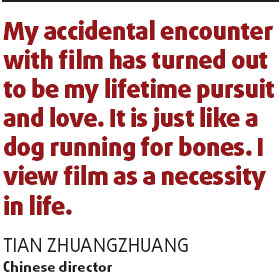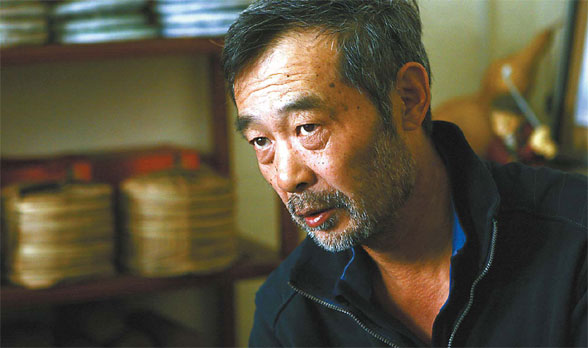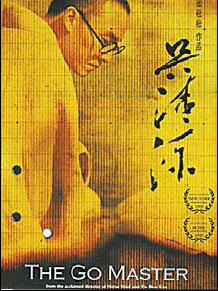Rebel with a cause
|
Tian Zhuangzhuang, one of the leading figures in China's filmmaking. Guo Yingguang |
With Zhang Yimou and his childhood friend Chen Kaige, Tian Zhuangzhuang forms the core of the Fifth Generation of directors that electrified the Chinese film industry in the 1980s. Tian's rural historical dramas like The Horse Thief (Dao Ma Zei) and Springtime in a Small Town (Xiaocheng Zhi Chun) have won over audiences all over the globe.
His latest, The Go Master (Wu Qingyuan), together with his earlier works including The Horse Thief, Springtime in a Small Town, The Blue Kite (Lan Fengzheng) and Delamu are now shown in London as part of a festival of Chinese films.
Tian's films along with a combination of international shorts inspired by life in Beijing are screening at the Institute of Contemporary Arts (ICA) in downtown London.
"It is always a good thing to let people in the world have the chance to know Chinese films no matter which directors' works are selected," Tian says.
From his office hidden away in the Beijing Film Studio, Tian explains what makes him tick.
"When I wake up in the morning, the first thing that strikes my head is film, the film I am working on, the film I am preparing and the film I have done," he says, sipping the tea in front of him. "This tea is from Yunnan province and given by my friends there. Over there is Pu'er tea grouped by age."
Rather than discuss cultural events, either at home or abroad, Tian, 56, prefers to talk about his works.

The Go Master, Tian's latest film, is a somber biopic of the go master Wu Qingyuan. "He has a very special quality in that the outside world never influenced him," Tian says. "He's a person who is quite pure and only lives in his beliefs. I deeply respected and liked him very much. Most people are chasing material things or results. The goal in his life was a kind of belief."
One of the most prominent filmmakers of China's Fifth Generation, a group credited with revitalizing the Chinese movies, Tian was born to parents who were prominent in the film industry. His father Tian Fang was a noted actor from the 1930s and a director for the Beijing Film Studios and his mother Yu Lan was a popular 1950s film star who later became the head of Beijing's Children's Film Studio.
Tian is noted for his ability to extract delicate emotions from strong or even barbaric material. This style is best exemplified in his movies Horse Thief in 1986 and On the Hunting Ground (Liechang Zhasa) in 1984.
Although his parents were highly involved in the film industry, as a child Tian didn't expect to follow in their footsteps. He says that he fell "accidentally in love" with movies.
"I hated film in the beginning," Tian recalls. "Because of my parents' jobs, I had many opportunities to watch movies. In those days all we had were propaganda films and Russian films in black-and-white, which were not that interesting for kids.
"And the air inside the cinemas was bad. I remember I stopped going to cinemas when I was 9 or 10 after I vomited there once due to the muggy air. The situation didn't change until I went to study at Beijing Film Academy in 1978.
Like many of his contemporaries who were in their teens or early 20s during the 1970s, Tian joined the army and traveled extensively, visiting remote parts of China. He later became a photographer, and it is this period in his life that undoubtedly provided the inspiration for many of his films.
In 1978, Tian joined the first class of the Beijing Film Academy to major in directing since the "cultural revolution" (1966-76). While at the academy, Tian got the chance to watch a number of films from China and other countries like France, Italy and Britain.
"Because colleges had been closed for so long, our professors had not taught in 10 years. They told us that all they could do was to show us films," Tian says. "So we often boarded a bus to the Beijing Film Archive and watched movies. It was great! We had the freedom to see whatever we wanted and dream about what we wanted to do in the future. We knew nothing about films. All we had was passion, and we became passionate about filmmaking. We loved European films and art-house movies then," he says.
Regularly cited as the group which brought Chinese films to the world stage, the Fifth Generation, Tian says, is a collection of filmmakers of a rare pedigree.
|
Tian's latest movie The Go Master is now shown in London as part of a festival of Chinese films. |
"The filmmakers of the Fifth Generation, as we were later called, were unique because we had some bumpy and uneasy experiences before actually becoming directors, witnessing the dramatic changes in society.
"I, for one, had something I really wanted to tell people, a message. My generation of film directors chose to fight to do what we wanted to do, instead of what others told us. We have a rebellious spirit and are very keen on new expressive ways and new thoughts, striving to find a new angle for each of the movies."
Horse Thief (1986), which Tian wrote and directed, displayed the vast panoramas of Tibet and marked a radical break from the aesthetic of earlier Chinese films. Rather than telling stories about the liberation of ethnic minorities, Tian, in On the Hunting Ground, for example, emphasizes the relationship between the land and the people. Long shots and long takes dominate; the landscape overpowers any identification with individual characters; the dialogue is minimal and social rituals remain unexplained.
Like Chen Kaige's Yellow Earth (Huang Tudi), On the Hunting Ground presents a visually stunning treatment of a remote China, told in a challenging, enigmatic style.
In the late 1980s and early 1990s, Tian directed three popular movies: Drum Singer (1987), Rock'n'Roll Kids (1988), and Li Lianying: The Imperial Eunuch (1991), diverging from his earlier works that highly valued purely artistic pursuits. Tian's other films include Red Elephant (1982), The Blue Kite (1991), and Springtime in a Small Town (2002).
"It is hard to tell what is inspiration. It can be developed from a concept flashing in my mind for just one second, or it can be developed from a sentence as well as a picture," Tian says.
Besides his feature works, Tian has also dabbled in documentary making. Delamu (2004) examines a 1,000-year-old route, which is a path that winds through the mountains of Yunnan province. The film made its North American premiere at the 2004 Tribeca Film Festival in New York.
"You never know when you will be inspired and when you can start filming. I went to Yunnan five times before I started filming there," Tian says.
"Wherever I go to a place, the first thing I will know is the time of the sunrise and the sunset," he says.
Apart from making his own films, Tian currently serves as the head of the directing department of Beijing Film Academy.
"My accidental encounter with film has turned out to be my lifetime pursuit and love. It is just like a dog running for bones. I view film as a necessity in life. Film makes me serene."
(China Daily 04/15/2008 page19)
















